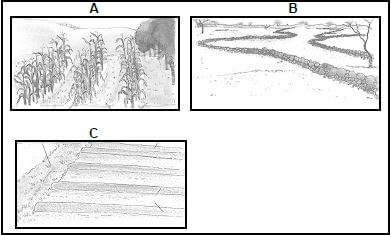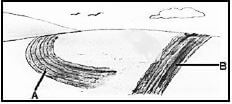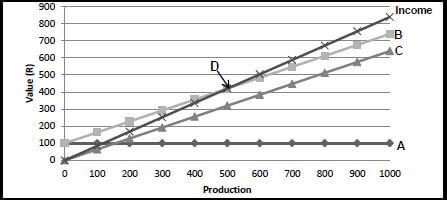AGRICULTURAL MANAGEMENT PRACTICES GRADE 12 QUESTIONS - NSC EXAMS PAST PAPERS AND MEMOS NOVEMBER 2018
Share via Whatsapp Join our WhatsApp Group Join our Telegram GroupAGRICULTURAL MANAGEMENT PRACTICES
GRADE 12
NSC EXAMS
PAST PAPERS AND MEMOS
NOVEMBER 2018
INSTRUCTIONS AND INFORMATION
- This paper consists of TWO sections.
- Answer ALL the questions in the ANSWER BOOK.
- Read the questions carefully and answer only what is asked.
- Number the answers correctly according to the numbering system used in this question paper.
- You may use a non-programmable calculator.
- Start EACH question on a NEW page.
- Write neatly and legibly.
QUESTIONS
SECTION A
QUESTION 1
1.1 Various options are provided as possible answers to the following questions. Choose the answer and write only the letter (A–D) next to the question numbers (1.1.1 to 1.1.10) in the ANSWER BOOK, e.g. 1.1.11 D.
1.1.1 The climatic factor that has an influence on biochemical and physiological processes in the plant:
- Wind
- Temperature
- Rain
- Humidity
1.1.2 Soil erosion in the veld leads to …
- veld depreciation.
- grasslands.
- veld degradation.
- Karoo veld.
1.1.3 Modern technology used in precision farming to correct variability in the field:
- VRT
- GIS
- GPS
- CIR
1.1.4 The process where topsoil and subsoil are collected to determine the nutrient status of the soil:
- Soil analysis
- Soil survey
- Soil sampling
- Soil data
1.1.5 The farm management principle which is characterised by setting the production process and its accompanying budget:
- Motivation
- Control
- Coordination
- Planning
1.1.6 … is used to determine the expiry date of a processed agricultural product.
- Planting date
- Harvesting date
- Marketing date
- Value added date
1.1.7 A method of payment using the internet:
- Electric fund raiser
- Cheque payment
- Electronic funds transfer
- Credit note
1.1.8 The agribusiness sector in which a farmer normally operates:
- Primary sector
- Secondary sector
- Tertiary sector
- Processing sector
1.1.9 It is necessary to update … records on a daily basis.
- labour
- yield
- electricity
- growth
1.1.10 The price setting method used by the farmer to determine equilibrium and then add 15% for profit:
- Supply and demand
- Market research
- Marketing chain
- Break-even point (10 x 2) (20)
1.2 Choose a description from COLUMN B that matches a term/phrase in COLUMN A. Write only the letter (A–L) next to the question numbers (1.2.1 to 1.2.10) in the ANSWER BOOK, e.g. 1.2.11 M. Use each description in COLUMN B only ONCE.
COLUMN A | COLUMN B |
1.2.1 General farm costs |
(10 x 2) (20) |
1.3 Give the CORRECT agricultural term for EACH of the following descriptions. Write only the term next to the question numbers (1.3.1 to 1.3.5) in the ANSWER BOOK, e.g. 1.3.6 Recording.
1.3.1 The financial resource which provides a farmer with financial protection against unforeseen events, like hail and fire
1.3.2 The number of products purchased by consumers at a given price
1.3.3 Labour legislation that provides for payment of employees who sustained injuries and contracted diseases in the workplace
1.3.4 A farming enterprise that tourists visit to see wild animals in their natural environment
1.3.5 Farm facilities required, such as storage facilities, electricity and roads (5 x 1) (5)
1.4 The following statements are INCORRECT. Change the UNDERLINED word(s) to make the following statements CORRECT. Write the answer next to the question numbers (1.4.1 to 1.4.5) in the ANSWER BOOK, e.g. 1.4.6 Fixed capital.
1.4.1 Money used in the process of operating the business, is income.
1.4.2 Creditors are the people who owe the business money.
1.4.3 A cheque is available in the form of bank notes and coins.
1.4.4 The source document issued to acknowledge that money has been received by the business is known as payments.
1.4.5 Trade mark is more concerned with the protection of the product, easy handling and displaying information to consumers. (5 x 1) (5)
TOTAL SECTION A: 50
SECTION B
QUESTION 2: PHYSICAL AND FINANCIAL PLANNING
Start this question on a NEW page.
2.1 The topography of a piece of land determines the soil productivity.
2.1.1 Redraw the table and explain how terrain and topographical aspects can affect the crop production potential of the soil. (3)
TERRAIN AND TOPOGRAPHICAL ASPECTS | PRODUCTION POTENTIAL |
Deep soil with few rocks, gentle slopes | |
Shallow soil on moderate rocky slope | |
Very steep slopes |
2.1.2 The pictures, A, B and C, below show different methods that farmers can use to prevent soil erosion. Identify EACH method and write the answer next to the letters (A, B and C) in the ANSWER BOOK.  (3)
(3)
2.1.3 Two different cultivation practices (A and B) are shown in the diagram below. Choose the CORRECT method to use on a 45° slope and give TWO reasons for your answer.  (3)
(3)
2.2 A beef farmer uses 2 000 ha of grassland veld type for grazing with a carrying capacity of 4 ha/LSU/year. The following groups of animals are kept on the farm, each with its own usage factor, as indicated in the table.
ANIMAL GROUP | NUMBER | USAGE FACTOR | TOTAL |
Lactating cows | 300 | 1,2 | 360 |
Calves 1–2 years | 300 | 0,6 | |
Replacement heifers | 60 | 1,0 | |
Bulls | 10 | 1,3 | |
Total | – | – |
2.2.1 Redraw and complete the table in the ANSWER BOOK. Calculate the total number of animals that the farmer has on the veld. (4)
2.2.2 Calculate the maximum number of large stock units (LSU) that this farm can accommodate according to the carrying capacity. (2)
2.2.3 State whether this farm is managed as a sustainable grazing unit. List THREE possible impacts on the sustainability. (4)
2.2.4 Give FIVE possible solutions to make the natural grazing unit more sustainable. (5)
2.3 Name and describe THREE main farming systems (methods) used within the commercial farming sector in South Africa. (6)
2.4 Name TWO activities where farmers may use animal traction to supplement tractor operation. (2)
2.5 State FOUR methods that a farmer can use to ensure a well-motivated productive workforce. (4)
2.6. Study the budget of a crop production enterprise below and answer the questions that follow.
EXPECTED INCOME | |||
Item | Amount | Unit price (R) | Total |
Sales | 400 bags | 250,00 | 100 000,00 |
Loan | 50 000,00 | ||
Hired plough | 10 000,00 | ||
TOTAL INCOME | 160 000,00 | ||
EXPECTED COSTS | |||
Item | Amount | Unit price (R) | Total |
Seed | 20 bags | 400,00 | 8 000,00 |
Fertilisers | 600 kg | 80,00/50 kg | 960,00 |
Wages | 8 | 850,00 | 6 800,00 |
Pesticides | 20 litres | 90,00 | 1 800,00 |
Transport | 4 000,00 | ||
TOTAL COST | 21 560,00 | ||
2.6.1 Name the type of financial statement that is compared to the values in the budget. (1)
2.6.2 Identify the item that is influenced by the change in interest rate and give a reason for the answer. (2)
2.6.3 Name ONE item that is influenced by the inflation rate. Explain how it will affect the values in the budget. (2)
2.6.4 State the item that is affected by labour legislation. (1)
2.7 Discuss how EACH of the following will affect the choice of production method:
2.7.1 Profitability (2)
2.7.2 Markets (2)
2.7.3 Policies (2)
2.8 Briefly discuss the following statement: Obtaining credit is a high-risk action. (2) [50]
QUESTION 3: ENTREPRENEURSHIP, RECORDING, MARKETING, BUSINESS PLANNING AND ORGANISED AGRICULTURE
Start this question on a NEW page.
3.1 Give ONE term for EACH of the following descriptions of a business plan:
3.1.1 The section that describes the pricing, marketing and promotion of the product (1)
3.1.2 The section that describes the operation or manufacturing (1)
3.1.3 The section that describes the employees (1)
3.1.4 This section is also used to identify the internal and external factors that are favourable or unfavourable to achieve your goals (1)
3.2 Name FIVE advantages of a business plan for a farming enterprise. (5)
3.3 A successful entrepreneur has certain managerial skills and personal characteristics.
3.3.1 List THREE factors that contribute to a successful manager. (3)
3.3.2 Use the information below to draw a flowchart that illustrates the phases of the entrepreneurial process. The different levels must be visible in your flowchart in the correct order. (4)
The phases of the entrepreneurial process are:
|
3.4 State THREE requirements of good business records. (3)
3.5 Describe the importance of a Balance Sheet for a farm owner. (3)
3.6 Distinguish between the following terms and give an appropriate example of each:
3.6.1 Diversification (2)
3.6.2 Specialisation (2)
3.7 There are several product organisations, such as Grain South Africa and Cape Mohair and Wool, which assist farmers with the production and marketing of their products.
3.7.1 Name and discuss the THREE roles of product organisations in the agricultural sector. (6)
3.7.2 State TWO disadvantages of product organisations. (2)
3.8 Examples of traditional methods of advertising are given in the list below.
word of mouth; newspaper and magazine advertisements; |
Name FOUR modern methods of advertising agricultural products that are not mentioned in the list above. (4)
3.9 Explain FIVE factors that influence the consumer's willingness to buy an agricultural product. (5)
3.10 The diagram below indicates the relationship between gross income and the different types of costs that will have an influence on the profit that a farmer will make. Study the diagram and answer the questions that follow. 
3.10.1 Choose a label for each graph from the list below. Write the label next to the letter (A, B and C) in the ANSWER BOOK.
- Fixed cost
- Variable cost
- Total cost (3)
3.10.2 Give the term for the point marked D. (1)
3.10.3 Explain the economic importance of point D, before point D and after point D, as marked on the graph. (3) [50]
QUESTION 4: HARVESTING, PROCESSING, MANAGEMENT AND AGRITOURISM
Start this question on a NEW page.
4.1 State FIVE important factors that a farmer must consider when doing pre-harvest planning of any crop. (5)
4.2 Describe FIVE good practices of handling agricultural products to ensure that the consumer gets products of high quality. (5)
4.3 Complete the table below in the ANSWER BOOK. Give an example of a fresh harvested agricultural product that is stored as indicated. (4)
STORAGE METHOD | EXAMPLE OF PRODUCT |
Cold storage at temperatures below 10 °C | 4.3.1 |
Freezing rooms at –20 °C | 4.3.2 |
Silos | 4.3.3 |
Stainless steel tanks between 0 °C and 3 °C | 4.3.4 |
4.4 Name FIVE advantages of bulk storage of agricultural products. (5)
4.5 List FOUR favourable growth conditions under which micro-organisms thrive. (4)
4.6 Evaluate the suitability of the following packaging materials for meat and related products:
4.6.1 Polystyrene (3)
4.6.2 Card board (3)
4.7 Identify, in the list below, the marketing channel that best suits EACH of the following scenarios:
auctions; farm-gate marketing; contract marketing; |
4.7.1 Marketing to large chain stores and food processors at a pre-set price and quantity (1)
4.7.2 Farmer sells produce via an online catalogue to consumers (1)
4.7.3 Farm animals are sold to the highest bidder (1)
4.7.4 The sale of fruit and vegetables at large central facilities through marketing agents (1)
4.8 Planning and coordination is critical for a farming enterprise.
4.8.1 State THREE advantages of planning. (3)
4.8.2 State THREE advantages of coordination. (3)
4.9 Describe the effect of motivation on workers and their productivity. (4)
4.10 A crop farmer decides to diversify by using the mountainous natural forest on the farm. A self-catering housing unit was built along the river flowing from the mountains through the farm. This natural forest area and the river are home to a variety of birds.
4.10.1 Name the type of enterprise the farmer is planning to add to the farming business. (1)
4.10.2 Design a flyer, of not more than half a page, that the farmer may use to advertise to attract visitors to the farm. (6) [50]
TOTAL SECTION B: 150
GRAND TOTAL: 200